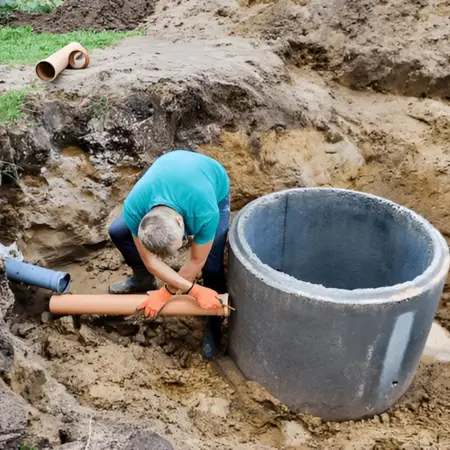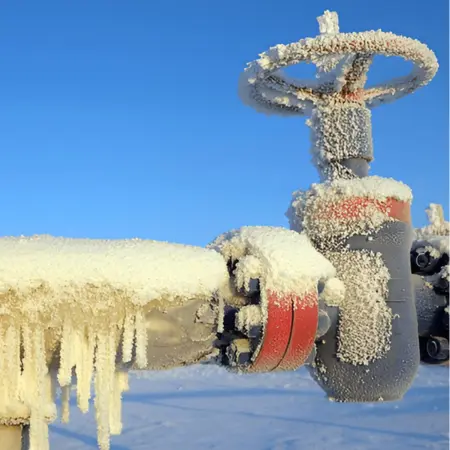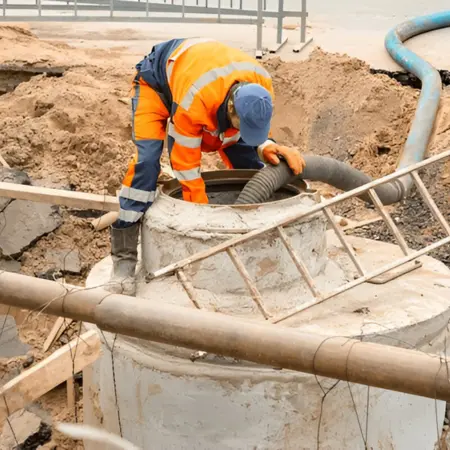Winter can bring unique challenges for septic systems, making them subject to problems.
Cold temperatures and snow can affect how well your system works.
Understanding these common septic system problems and their fixes can help keep your system even.
Key Takeaways
- Pipes can freeze if they aren’t insulated well or buried too shallow.
- In cold weather, the bacteria that help break down waste slow down.
- While the drain field thaws, ensure the use of less water in the house.
- A layer of mulch, like wood chips, can help protect the drain field.
- Frost-proof risers and covers help keep your septic system from freezing.
- Using bacterial supplements for septic systems can improve performance in winter.
4 Common Septic System Problems In Winter
Here are some common septic system problems that can happen in winter.
Cold weather can cause issues like frozen pipes and slow drainage.
1. Frozen Pipes
Frozen pipes can occur if there isn’t enough insulation or if the pipes are too shallow.
They can also freeze when temperatures drop too low.
You might notice slow drainage, gurgling noises, or no water flow.
Keeping pipes insulated can help prevent this issue.

2. Frozen Drain Fields
When the ground freezes, water can stop draining properly.
This leads to water backing up in your system and wet patches on your lawn.
If you see these signs, your drain field might be frozen.
3. Slow Bacterial Breakdown
In colder temperatures, the bacteria that break down waste become less active.
This can cause unpleasant odors and slow down the system’s performance.
Keeping the septic tank warm enough is important for proper function.
4. Increased Water Usage During Holidays
During holiday gatherings, more people in the home mean more water usage.
This can overload the septic system, leading to slow drainage and backups.
Being mindful of water use during busy times can help prevent these issues.
How To Fix Common Winter Septic Problems
Here’s how to fix common winter septic problems easily.
These tips help keep your system working well and prevent bigger issues this winter.
1. Thawing (Melting) Frozen Pipes
First, turn off the water supply to safely thaw frozen septic pipes.
Then, use a hairdryer or heat tape to warm the pipes gently.
Avoid using open flames.
If you can’t thaw the pipes, calling a professional for help is best.
Contact us at OP Plumbing Hub for expert services.

2. Dealing With A Frozen Drain Field
While waiting for the drain field to thaw, avoid using water in the house as much as possible.
This prevents backups.
Do not drive or park on the field when it freezes to avoid damaging it.
Keep snow piled on it to cover it.
3. Managing System Overload
If your septic system is backing up or draining slowly due to holiday usage, limit water use.
Spread out laundry and dishwashing over several days.
This helps ease the load on the system and allows it to recover.
4. Restoring Bacterial Activity (Breaking Down Of Waste)
Using bacterial supplements designed for septic systems can boost system performance in winter.
These products help restore waste’s natural breakdown.
To prevent further bacterial slowdown, avoid flushing harsh chemicals down the drain.
Signs You Need Professional Help
You can handle small problems like checking for clogs and adding bacteria.
Yet, call a septic professional for major issues like backups, frozen pipes, or drain field problems.
Ignoring septic problems can lead to serious damage.
If wastewater leaks into your yard, it can cause:
- Expensive repairs
- Health risks
- Environmental issues.
Look for licensed and secured septic professionals in your area.
Check online reviews and ask for recommendations from friends and family.
Always get quotes from a few companies before deciding.
Contact us at Septic System Services for the best services.

How To Prevent Septic System Problems In Winter
Here’s how to keep your septic system safe during winter.
Follow these tips to avoid problems when it’s cold.
1. Proper Insulation (Cover)
Before winter, cover your septic system components.
Use foam pipe insulation for any exposed pipes.
Wrap tanks with insulated blankets or specialized covers.
This helps keep the warmth inside, preventing freezing.
A mulch layer, a material like wood chips, can protect the drain field.
Spread mulch around the area to insulate the ground.
Snow also acts as an insulator.
Avoid digging snow off the drain field.
Let it stay to help keep the ground warm.
2. Limit Water Usage
During busy times like the holidays, try to reduce water use.
Spread out laundry and dishwashing over several days.
Avoid running many appliances at once.
This prevents overload on the system and keeps it functioning well.
3. Schedule Regular Maintenance
Have your septic system inspected before winter hits.
A professional can check for issues that might worsen in the cold.
Regular maintenance helps identify problems early, saving you trouble later.
Contact us at OP Plumbing Hub for expert services.
4. Install Frost-Proof Risers (Pipes) And Covers
Frost-proof risers and covers are designed to keep your septic system safe from freezing.
They provide easy maintenance access while insulating the tank.
This added protection helps ensure your system runs smoothly all winter long.
Conclusion
This article discusses common septic problems in winter.
Solutions to fix them have also been discussed.
When to get professional help and how to prevent septic systems have also been discussed.
Contact us at OP Plumbing Hub for high-quality services and expert advice.
